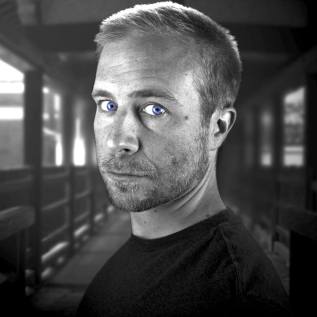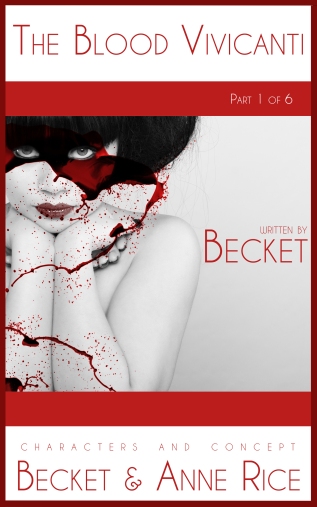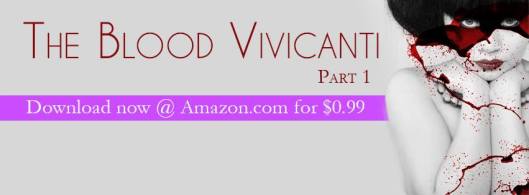The wonderful Lindsey Beth Goddard recently did this great interview with my friend Vincenzo Bilof. She kindly gave me permission to reblog it, so without further ado, here 'tis.


What inspired you to write your first book?
The first book I published or the first book I wrote? Well, the first novel I wrote is sitting on my computer. It’s a zombie novel called The City Wore a Sullen Face, and it’s mostly a Dystopian/Philosophy book that is more George Orwell than George Romero. I haven’t published it because the book is almost an anti-zombie novel.
Right now, all of my work is inspired by nightmares. I’m a vivid dreamer, and each novel is a series of images, or movie posters. Bad ones, like the ones for Nicolas Cage films.
Do you write every single day?
During the summer, I write every day, if possible. If “The Song that Doesn’t End” is playing in the background, that’s a distraction and can potentially end my writing “career,” because then I’ll just keep on singing it forever just because this is the song that doesn’t end, yes it goes on and on my friend…
Do events from your past play a role in your writing?
I believe this is true of all writing, whether consciously or subconsciously; my mind is a composition of words and images influenced by the past. I don’t consciously add things into my work that are moments I’ve lived or experienced. You should have to do some research while writing, but you can write about things you know and understand; since this knowledge is something you’ve learned in your past, then the past plays a role in every author’s writing.
The short answer is that every author uses the past subconsciously. I don’t intentionally incorporate past moments. I sometimes remember the moment when the slipper didn’t fit my cute foot, and maybe that has something to do with the emotional investment in my books. I guess elephants get angry sometimes, too.
Do you try to put messages and morals into your fiction, or do you write simply to entertain the reader?
I learn about my characters as a story progresses, and I believe readers can learn something from them, too. Reading is ultimately an experience that is exclusive to the reader; when you open the pages of a book for the first time, your own world and experiences interacts with the story in front of you. I believe in telling a story, and let the reader take what they will from what I provide. I think it’s silly to force an idea down a reader’s throat, unless you’re writing with a purpose in mind, a purpose that already has an audience. If I include a message it’s usually spelled backward.
Where can we find your work?
Amazon! I also have a list of novels on my blog. Sometimes, Amazon can be confusing, because it also includes anthologies and whatnot. I’m not saying I’m an Amazonian… I’m referring to the website where people can buy stuff.
Are character names important to you? How about settings?
Let’s say you start a book with three women in a room. Mary, Jane, and Ashley. The opening chapter includes all three of these women and the reader is forced to distinguish between them. Do the same thing with men: Rick, Joe, Bob.
Let’s say the author is intent on keeping these three characters around for a bit. Connie, Alice, and Madeline. The men? Jimmy, Mitch, Frank. What if these characters are better known for their nicknames, or their last names? Isn’t your name important to you? When you think about your close friends and relatives, you likely can’t imagine any of them having a different name, because their name is linked to who they are (as you perceive them). A name means something to an individual, and if your characters are supposed to come to life, their names have to matter. Think of your favorite television show… do the character names help make them distinguishable from one another? Ross, Chandler, and Joey… Three characters from the show Friends, and their names should easily conjure images of the people they portray.
Setting is just as important. Why does it matter if the sky is blue? Why does it matter if there’s lightning? Just as a filmmaker uses light and shadow in a scene, so should a writer use setting as part of the composition. A good setting establishes mood, contrasting elements, and characterization; a hot desert or a torrential storm can become an opposing force characters must contend with. Having diarrhea in the middle of overtime in Game 7 of the Stanley Cup Finals (Detroit against Chicago) is quite inconvenient… So yes, setting is important. I’d hate to miss the Wings score the winning goal.
Do you remember the first thing you ever wrote?
Yup. When I was in First Grade I had a Ninja Turtle coloring book that had a writing prompt in it. I was about five or six years old at the time, and the prompt had something to do with a picture. I filled the page (the lines didn’t have those massive spaces between them). To this day, I remember my mom was impressed because I knew how to spell the word “suddenly”. Now, I hate using or seeing the word in a book, because it’s unnecessary. I suddenly don’t care about that word. Or maybe not so suddenly. But maybe.
What are you working on at the moment?
Let’s see… Vampire Strippers from Saturn; Mother, I’m Not an Android; and Japanese Werewolf Apocalypse. I’m also working on improving myself as a person every day by riding goats, training to be a cosmonaut, and building a better relationship between aliens and humankind.
Have you ever considered collaborating with another author?
Yes. William Cook and I are going to be working on a project together in the near future, and I’ve been asked by other authors to contribute. I can write a chapter if someone else gives me a chapter, first. I’m willing to work with most authors, depending on time constraints and interest in the piece.
Please tell us about yourself. What are your hobbies? What inspires you?
Writing is my hobby. I’m an English teacher, and writing is something I do for fun, because a couple publishers have let me get away with it.
I don’t understand the idea behind “inspiration.” I’m just a dude who has nightmares and puts them down on paper.
Where do you see yourself in ten years from now?
Chilling on the porch with my kids, eating ice cream, and reading a comic book. I’ll probably see you at the Stanley Cup parade in Detroit when the Red Wings bring the title back home where it belongs. I’ll be there. I’ll be a crusty old dude in a classroom, with some zany glasses on (zebra-striped). I imagine we’ll all have microchips implanted in our skulls at that point, so maybe I’ll be living on a secluded island where the birds can speak Spanish and Cantonese.
What advice do you have for aspiring writers?
Write, and read. Forgive yourself and realize you haven’t written the next American classic. Not everyone is going to love your book. In fact, most people will likely hate it, unless you’re letting your dog and cat leave reviews for you.
Where can we find you on the web?
Right next to the spider.


What inspired you to write your first book?
The first book I published or the first book I wrote? Well, the first novel I wrote is sitting on my computer. It’s a zombie novel called The City Wore a Sullen Face, and it’s mostly a Dystopian/Philosophy book that is more George Orwell than George Romero. I haven’t published it because the book is almost an anti-zombie novel.
Right now, all of my work is inspired by nightmares. I’m a vivid dreamer, and each novel is a series of images, or movie posters. Bad ones, like the ones for Nicolas Cage films.
Do you write every single day?
During the summer, I write every day, if possible. If “The Song that Doesn’t End” is playing in the background, that’s a distraction and can potentially end my writing “career,” because then I’ll just keep on singing it forever just because this is the song that doesn’t end, yes it goes on and on my friend…
Do events from your past play a role in your writing?
I believe this is true of all writing, whether consciously or subconsciously; my mind is a composition of words and images influenced by the past. I don’t consciously add things into my work that are moments I’ve lived or experienced. You should have to do some research while writing, but you can write about things you know and understand; since this knowledge is something you’ve learned in your past, then the past plays a role in every author’s writing.
The short answer is that every author uses the past subconsciously. I don’t intentionally incorporate past moments. I sometimes remember the moment when the slipper didn’t fit my cute foot, and maybe that has something to do with the emotional investment in my books. I guess elephants get angry sometimes, too.
Do you try to put messages and morals into your fiction, or do you write simply to entertain the reader?
I learn about my characters as a story progresses, and I believe readers can learn something from them, too. Reading is ultimately an experience that is exclusive to the reader; when you open the pages of a book for the first time, your own world and experiences interacts with the story in front of you. I believe in telling a story, and let the reader take what they will from what I provide. I think it’s silly to force an idea down a reader’s throat, unless you’re writing with a purpose in mind, a purpose that already has an audience. If I include a message it’s usually spelled backward.
Where can we find your work?
Amazon! I also have a list of novels on my blog. Sometimes, Amazon can be confusing, because it also includes anthologies and whatnot. I’m not saying I’m an Amazonian… I’m referring to the website where people can buy stuff.
Are character names important to you? How about settings?
Let’s say you start a book with three women in a room. Mary, Jane, and Ashley. The opening chapter includes all three of these women and the reader is forced to distinguish between them. Do the same thing with men: Rick, Joe, Bob.
Let’s say the author is intent on keeping these three characters around for a bit. Connie, Alice, and Madeline. The men? Jimmy, Mitch, Frank. What if these characters are better known for their nicknames, or their last names? Isn’t your name important to you? When you think about your close friends and relatives, you likely can’t imagine any of them having a different name, because their name is linked to who they are (as you perceive them). A name means something to an individual, and if your characters are supposed to come to life, their names have to matter. Think of your favorite television show… do the character names help make them distinguishable from one another? Ross, Chandler, and Joey… Three characters from the show Friends, and their names should easily conjure images of the people they portray.
Setting is just as important. Why does it matter if the sky is blue? Why does it matter if there’s lightning? Just as a filmmaker uses light and shadow in a scene, so should a writer use setting as part of the composition. A good setting establishes mood, contrasting elements, and characterization; a hot desert or a torrential storm can become an opposing force characters must contend with. Having diarrhea in the middle of overtime in Game 7 of the Stanley Cup Finals (Detroit against Chicago) is quite inconvenient… So yes, setting is important. I’d hate to miss the Wings score the winning goal.
Do you remember the first thing you ever wrote?
Yup. When I was in First Grade I had a Ninja Turtle coloring book that had a writing prompt in it. I was about five or six years old at the time, and the prompt had something to do with a picture. I filled the page (the lines didn’t have those massive spaces between them). To this day, I remember my mom was impressed because I knew how to spell the word “suddenly”. Now, I hate using or seeing the word in a book, because it’s unnecessary. I suddenly don’t care about that word. Or maybe not so suddenly. But maybe.
What are you working on at the moment?
Let’s see… Vampire Strippers from Saturn; Mother, I’m Not an Android; and Japanese Werewolf Apocalypse. I’m also working on improving myself as a person every day by riding goats, training to be a cosmonaut, and building a better relationship between aliens and humankind.
Have you ever considered collaborating with another author?
Yes. William Cook and I are going to be working on a project together in the near future, and I’ve been asked by other authors to contribute. I can write a chapter if someone else gives me a chapter, first. I’m willing to work with most authors, depending on time constraints and interest in the piece.
Please tell us about yourself. What are your hobbies? What inspires you?
Writing is my hobby. I’m an English teacher, and writing is something I do for fun, because a couple publishers have let me get away with it.
I don’t understand the idea behind “inspiration.” I’m just a dude who has nightmares and puts them down on paper.
Where do you see yourself in ten years from now?
Chilling on the porch with my kids, eating ice cream, and reading a comic book. I’ll probably see you at the Stanley Cup parade in Detroit when the Red Wings bring the title back home where it belongs. I’ll be there. I’ll be a crusty old dude in a classroom, with some zany glasses on (zebra-striped). I imagine we’ll all have microchips implanted in our skulls at that point, so maybe I’ll be living on a secluded island where the birds can speak Spanish and Cantonese.
What advice do you have for aspiring writers?
Write, and read. Forgive yourself and realize you haven’t written the next American classic. Not everyone is going to love your book. In fact, most people will likely hate it, unless you’re letting your dog and cat leave reviews for you.
Where can we find you on the web?
Right next to the spider.
Amazon Author Page: http://www.amazon.com/Vincenzo-Bilof/e/B005Z62FMU/ref=sr_ntt_srch_lnk_2?qid=1377788307&sr=8-2-spell
Twitter: https://twitter.com/VincenzoAuthor
Facebrick: https://www.facebook.com/vincenzo.bilof
Bizarro Pulp Press (Editor): http://bizarropulppress.com/about














